ARTICLE AD BOX


Damian Grammaticas
Political Correspondent

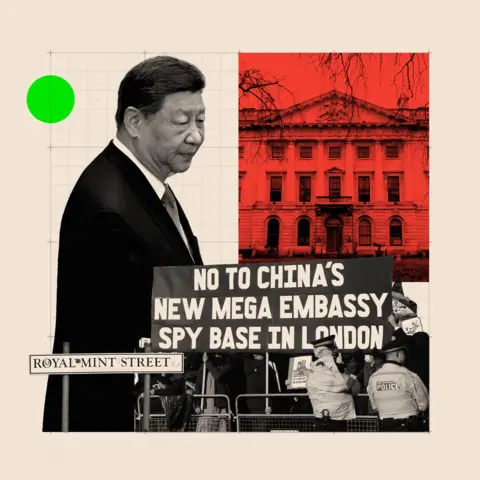 BBC
BBC
The sheet of paper says "Wanted Person" at the top. Below is a photo of a young woman, a headshot that might have been taken in a studio. She looks directly at the camera, smiling with her teeth showing, and her dark, shoulder-length hair is neatly brushed.
At the bottom, in red, are the words: "A reward of one million Hong Kong dollars," together with a UK phone number.
To earn the money, about £95,000, there is a simple instruction: "Provide information on this wanted person and the related crime or take her to Chinese embassy".
The woman from the photo is standing in front of me. She shudders when she looks at the building.
We are outside an imposing structure that was once home to the Royal Mint and which China hopes it can develop into a new mega-embassy in London, replacing the far smaller premises it has occupied since 1877.

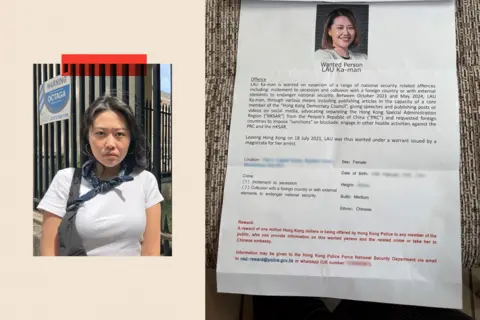
Carmen Lau fled Hong Kong in 2021 as pro-democracy activists were being arrested
The new premises, opposite the Tower of London, is already being patrolled by Chinese security guards. The building is ringed with CCTV cameras too.
"I've never been this close," admits Carmen Lau.
Carmen, who is 30, fled Hong Kong in 2021 as pro-democracy activists in the territory were being arrested.
She argues that the UK should not allow China's "authoritarian regime" to have its new embassy in such a symbolic location. One of her fears is that China, with such a huge embassy, could harass political opponents and could even hold them in the building.
There are also worries, among some dissidents, that its location - very near London's financial district - could be an espionage risk. Then there is the opposition from residents who say it would pose a security risk to them.
The plans had previously been rejected by the local council, but the decision now lies with the government - and senior ministers have signalled they are in favour if minor adjustments are made to the plan.
The site is sprawling, at 20,000 square metres, and if it goes ahead it would mark the biggest embassy in Europe. But would it also really bring the dangers that its opponents fear?
The biggest embassy in Europe
China bought the old Royal Mint Court for £255m in 2018. The area has layer upon layer of history: across the road is the Tower, parts of it were built by William the Conqueror. For centuries kings and queens lived there.
The plan itself involves a cultural centre and housing for 200 staff, but in the basement, behind security doors, there are also rooms with no identified use on the plans.
"It's easy for me to imagine what would happen if I was taken to the Chinese embassy," says Carmen.

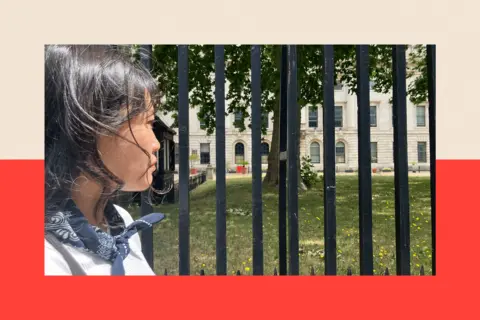
Carmen fled to London but believes she has continued to be targeted
In 2022, a Hong Kong pro-democracy protester was dragged into the grounds of the Chinese consulate in Manchester and beaten. British police nearby stepped over the boundary to rescue him.
Back in 2019, mass protests had erupted in Hong Kong, triggered by the government's attempt to bring in a new law allowing for Hong Kong citizens to be extradited to China.
China's response included a law that forced all elected officials in Hong Kong, including Carmen who was then a district councillor, to take an oath of loyalty to China. Carmen resigned instead.
She claims that journalists for Chinese state-run media started following her. The Ta Kung Pao newspaper, which is controlled by China's central government in Beijing, ran a front page story alleging she and her colleagues had held parties in their council offices.
"You know the tactics of the regime," she says. "They were following you, trying to harass you. My friends and my colleagues were being arrested."
Carmen fled to London but believes that she has continued to be targeted.
Hong Kong issued two arrest warrants for her alleging "incitement to secession and collusion with a foreign country or with external elements to endanger national security".
The bounty letter sent from Hong Kong to half a dozen of her neighbours followed.
"The regime just [tries] to eliminate any possible activists overseas," she says.

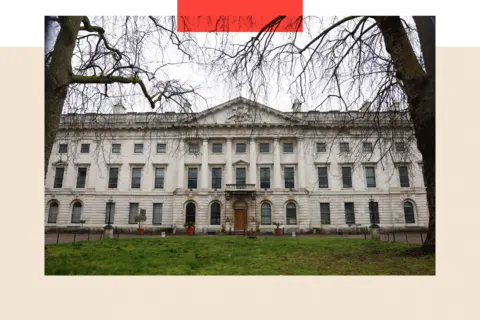 PA Media/ Neil Hall/EPA-EFE/REX/Shutterstock
PA Media/ Neil Hall/EPA-EFE/REX/Shutterstock
If China's plans for an embassy at the Royal Mint Court are approved, it will be the biggest in Europe
Steve Tsang, a political scientist and historian who is director of the SOAS China Institute, says he can see why people from Hong Kong, or certain other backgrounds, may be uncomfortable with the new embassy.
He argues "the Chinese government since 1949 does not have a record of kidnapping people and holding them in their embassy compounds."
But he says some embassy staff would be tasked with monitoring Chinese students and dissidents in the UK and they'd also target UK citizens, such as scientists, business people, and those with influence, to advance China's interests.
The Chinese embassy told the BBC it "is committed to promoting understanding and the friendship between the Chinese and British peoples and the development of mutually beneficial cooperation between the two countries. Building the new embassy would help us better perform such responsibilities".
Warnings about espionage
There is another fear, held by some opponents, that the Royal Mint Court site could allow China to infiltrate the UK's financial system by tapping into fibre optic cables carrying sensitive data for firms in the City of London.
The site once housed Barclays Bank's trading floor, so it was wired directly into the UK's financial infrastructure. Nearby, a tunnel has, since 1985, carried fibre optic cables under the Thames serving hundreds of City firms.
And in the grounds of the Court, is a five-storey brick building - the Wapping Telephone Exchange that serves the City of London.
According to Prof Periklis Petropoulos, an optoelectronics researcher at Southampton University, direct access to a working telephone exchange could allow people to glean information.

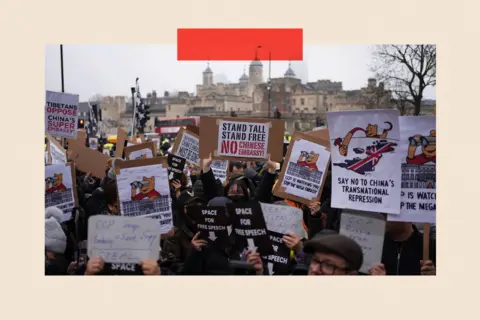 Jordan Pettitt/PA Wire
Jordan Pettitt/PA Wire
Protesters gather at the proposed site of the new embassy
This has all prompted warnings about potential espionage - including from Conservative frontbencher Kevin Hollinrake, as well as senior Republicans in the US.
An official with security experience in former US president Joe Biden's administration told me it's perfectly possible that cables could be tapped with devices that would capture passing information - and that this would be almost impossible to detect.
"Anything up to half a mile from the embassy would be vulnerable," he says.

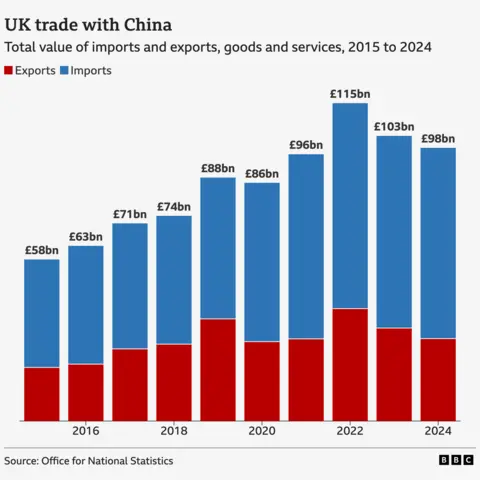
However, he argues that China may not be inclined to do this because it has other ways of hacking into systems.
Regarding these concerns, the Chinese embassy said: "Anti-China forces are using security risks as an excuse to interfere with the British government's consideration over this planning application.
"This is a despicable move that is unpopular and will not succeed."
What the neighbours think
At the back of the Royal Mint Court is a row of 1980s-built flats. Mark Nygate has lived here for more than 20 years. He gestures across his low garden wall. "Embassy staff will live there and overlook us," he says.
"We don't want [the embassy] there because of demonstrations, because of the security risks, because of our privacy."
Opponents of the embassy - Hong Kongers, Tibetans, Uighurs, and opposition politicians - have already staged protests involving up to 6,000 people.
Mostly, though, he fears an attack on the embassy - that could harm him and his neighbours.


Local resident Mark Nygate fears an attack on the new embassy which could also affect neighbours
But Tony Travers, a visiting professor in the LSE Department of Government, lives near the current embassy and isn't convinced that these sorts of protests will materialise for the new neighbours, if the relocation goes ahead.
"I'm not aware of any evidence that there are regular protests that block the road outside the current Chinese embassy… self-evidently, there are much larger protests outside a number of other countries' embassies and high commissions."
The Chinese embassy in London says that the proposed development would "greatly improve the surrounding environment and bring benefits to the local community and the district".
When President Xi raised the issue
China's first planning application to develop the site was rejected by Tower Hamlets council in 2022 over safety and security concerns - and fears protests and security measures could damage tourism.
Rather than amend the plan or appeal, China waited, then resubmitted an identical application in August 2024, one month after Labour came to power.
On 23 August, Sir Keir Starmer phoned Chinese President Xi Jinping for their first talks. Afterwards Sir Keir confirmed that Xi had raised the issue of the embassy.

 Stefan Rousseau/PA Wire
Stefan Rousseau/PA Wire
Sir Keir Starmer and Chinese President Xi Jinping have spoken about the proposed new embassy
Since then, Deputy Prime Minister Angela Rayner has exercised her power to take the matter out of the council's hands, after being urged to do so by Foreign Secretary David Lammy.
This is in the context of an attempt by the government to engage with China after previous Conservative Prime Minister Rishi Sunak declared in 2022 that the so-called "golden era" of UK-China relations were over.
For his part, Prof Travers believes that politics is involved in planning decisions.
"The Secretary of State has to make the decision on the basis of the documentation in front of them and the law surrounding and affecting the issue," he argues.
"But it would be naïve to imagine that politics didn't play a role."
'Kissing up to China'
Lord Peter Ricketts, a former diplomat who chaired the UK's National Security Council, advising prime ministers on global threats, stresses that the country's relationship with China is complex.
A National Security Strategy published in June laid out the conflicting priorities in the government's approach, highlighting its desire to use the relationship to boost the UK economy but also likely "continued tension" over human rights and cyber security.
But is that duality of reaping the business benefits while pushing on the human rights transgressions, even possible?

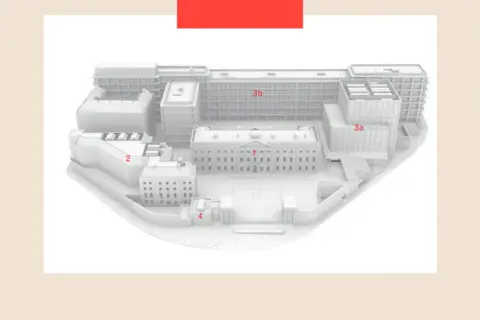 David Chipperfield architects
David Chipperfield architects
Drawings of the proposed Royal Mint Court site demonstrate its scale
"It is absolutely an adversary in some areas, which tries to steal our intellectual property, or suborn our citizens," says Lord Ricketts. "(But) it is a commercial market, a very important one for us, and it's a player in the big global issues like climate and health.
"We have to be able to treat China in all those categories at the same time."
The embassy decision, he says, cuts to the heart of this. "There are acute dilemmas, and there are choices to be made, whether to privilege the 30, 40 or 50-year relationship with China, which an embassy, I guess, would symbolise.
"Or whether to give priority to the short-term security threats, which are no doubt real as well."

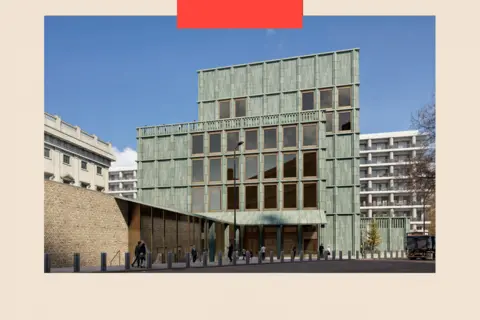 David Chipperfield architects
David Chipperfield architects
Image produced by architects of the proposed Cultural Exchange building at the new embassy
The Conservative MP Sir Iain Duncan Smith is convinced giving the go-ahead for the new embassy would be a big mistake. "They think that the only way they'll get growth is by kissing up to China and getting them to invest," he tells me.
But for all the concerns around security, having one big embassy could well make it easier to keep an eye on what Chinese officials are up to in the UK, according to Prof Tsang.
"Allowing the Chinese to put their staff on one site is preferable," he argues, "because they're at the moment all over the place in London, you can't actually keep an eye on them."
He is not convinced that rejecting or approving the embassy will have an effect on business and trade.
"The Chinese are the absolute ultimate pragmatists. They are not going to suddenly say that no, we're not selling our best electric vehicles to you any longer just because you denied us the embassy," he says.
But, equally, "they are not going to substantially increase Chinese investments in the UK because they have got the new embassy compound."
If Angela Rayner thinks that too, then her decision may well come down to how seriously she takes the warnings that China could eavesdrop on the UK's banks.
If she rejects the embassy it may be because she judges the danger it poses to be very real indeed.
Top image credits: Reuters, Richard Baker via Getty Images, SOPA Images via Getty Images and EPA -EFE/REX/Shutterstock
BBC InDepth is the home on the website and app for the best analysis, with fresh perspectives that challenge assumptions and deep reporting on the biggest issues of the day. And we showcase thought-provoking content from across BBC Sounds and iPlayer too. You can send us your feedback on the InDepth section by clicking on the button below.

 3 hours ago
10
3 hours ago
10








 English (US) ·
English (US) ·